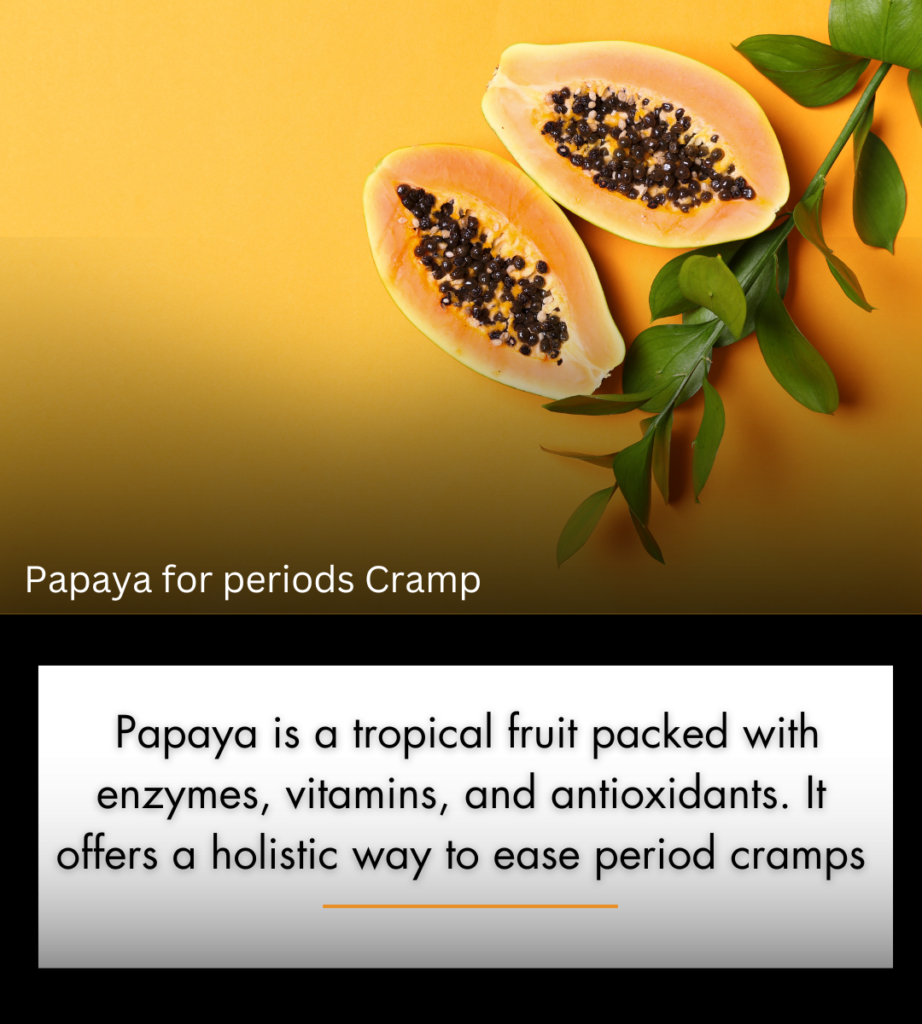papaya for periods Cramp: Dealing with period cramps can be tough. They disrupt our daily lives and cause a lot of discomfort. But there’s hope! People are showing interest in natural solutions, like papaya. Papaya is a tropical fruit packed with enzymes, vitamins, and antioxidants. It offers a holistic way to ease period cramps without the side effects of regular medications.

Nutrients Presents in Papaya
A large amount of trace elements are found in papaya which are essential for our body. Papaya in itself is a fruit which is rich in all vitamins and minerals.Papaya is a rich source of various nutrients that contribute to its health benefits. Some of the key nutrients found in papaya include:
1. Vitamin C: Papaya is abundant in vitamin C, an essential antioxidant that supports immune function, collagen synthesis, and wound healing.
2. Vitamin A: Papaya contains beta-carotene, a precursor to vitamin A, which is crucial for vision health, immune function, and skin health.
3. Vitamin E: Another antioxidant present in papaya, vitamin E helps protect cells from damage caused by free radicals and supports skin health.
4. Folate (Vitamin B9): Folate is important for cell division and DNA synthesis, making it essential for growth and development, especially during pregnancy.
5. Potassium: Papaya is a good source of potassium, an electrolyte that helps regulate blood pressure, muscle contractions, and nerve function.
6. Magnesium: Magnesium is involved in hundreds of biochemical reactions in the body, including muscle and nerve function, protein synthesis, and blood glucose control.
7. Fiber: Papaya contains dietary fiber, which promotes digestive health, regulates bowel movements, and helps prevent constipation.
8. Papain: Papaya contains enzymes like papain, which aid in digestion by breaking down proteins into smaller peptides and amino acids.
9. Choline: Choline is important for brain health, liver function, and metabolism, and papaya contains small amounts of this essential nutrient.
10. Lycopene: Papaya is rich in lycopene, a powerful antioxidant associated with a reduced risk of certain cancers and cardiovascular disease.
These nutrients work synergistically to support overall health and well-being, making papaya a nutritious addition to any diet.
How Papaya Helps:
- Anti-Inflammatory Properties: Papaya fights inflammation in our bodies. This can reduce pain during periods.
- Regulating Hormones: Papaya helps balance hormones. When our hormones are in check, we experience less discomfort.
- Nutritional Benefits: Papaya’s nutrients support overall health, making us feel better during our menstrual cycles.
Papaya offers relief from period pain through several mechanisms:
- Anti-inflammatory Properties: Papaya contains enzymes like papain and chymopapain, which possess powerful anti-inflammatory properties. Inflammation often contributes to the discomfort experienced during menstruation, such as abdominal cramps and bloating. By reducing inflammation, papaya helps alleviate these symptoms, providing relief from period pain.
- Muscle Relaxation: The enzymes present in papaya, particularly papain, have been found to promote muscle relaxation. This relaxation effect can help ease muscle contractions in the uterus, which are a common cause of period cramps. By soothing these contractions, papaya contributes to pain relief during menstruation.
- Hormonal Balance: Papaya contains phytoestrogens, plant-based compounds that can help regulate hormonal activity in the body. Hormonal fluctuations are a key factor in menstrual discomfort, contributing to mood swings, irritability, and fatigue. By promoting hormonal balance, papaya offers a natural way to mitigate these symptoms and alleviate period pain.
- Nutritional Support: Papaya is rich in vitamins, minerals, and antioxidants, which are essential for overall health and well-being. These nutrients support various bodily functions, including those involved in managing menstrual symptoms. By providing nutritional support, papaya helps the body cope with the physical and hormonal changes that occur during menstruation, reducing the severity of period pain.
papaya offers a multifaceted approach to relieving period pain, addressing inflammation, muscle contractions, hormonal imbalance, and providing essential nutrients.
Other Health Benefits of Papaya
- Digestive Health:
Papaya contains enzymes like papain, which aid in the digestion of proteins and support overall digestive health. Regular consumption of papaya can help prevent constipation, bloating, and other digestive issues. - Anti-inflammatory Properties:
The enzymes and antioxidants in papaya have anti-inflammatory effects, which can help reduce inflammation throughout the body. This may alleviate symptoms of conditions such as arthritis and promote overall health and well-being. - Immune Support:
Papaya is rich in vitamin C and other antioxidants, which help boost the immune system and protect against infections and illnesses. Regular consumption of papaya may help reduce the risk of colds, flu, and other common ailments. - Heart Health:
The antioxidants and fiber in papaya can help lower cholesterol levels and improve heart health. Additionally, the potassium in papaya helps regulate blood pressure, reducing the risk of heart disease and stroke. - Skin Health:
The vitamin C, vitamin A, and other antioxidants in papaya promote healthy skin by protecting against free radical damage, reducing wrinkles and other signs of aging, and promoting collagen production. - Eye Health: Papaya is rich in beta-carotene, lutein, and zeaxanthin, which are beneficial for eye health. These antioxidants help protect the eyes from age-related macular degeneration and other vision problems.
- Weight Management:
Papaya is low in calories and high in fiber, making it a satisfying and nutritious choice for those trying to lose or maintain weight. The fiber in papaya helps keep you feeling full for longer and supports healthy digestion. - Cancer Prevention:
Some studies suggest that the antioxidants and other compounds in papaya may help prevent certain types of cancer, including colon, breast, and prostate cancer. However, more research is needed to confirm these potential benefits.
